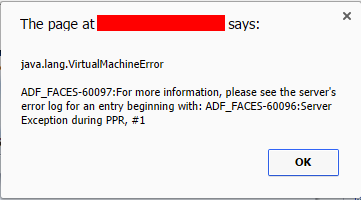While integrating OIM 11g with the ICF connector resource for reconciliation, I would often get the following error, javax.servlet.ServletException: java.lang.InstantiationError: java.lang.VirtualMachineError after a couple of attempts:
This error was in conjunction with another blog, ADF_FACES-60098:Faces lifecycle receives unhandled exceptions java.lang.VirtualMachineError. Whereby the error publishing could be resolved by clearing out the JOB_HISTORY table with the rows related to your scheduled task.

I did however notice that this issue became more frequent. Furthermore, the reconciliation data that was not coming in as expected. As mentioned within the blog, The solution was somewhat temporary though the root cause was unknown until later on. As a check, the server had sufficient memory available as well as the java managed server being allocated JVM max of 8GB as well as the Max Heap Size being 2GB. The full Stack from the nohup.out logs are as follows: The following error within the GUI would be, java.land.VirtualMachineError ADF_FACES-60097:For more information, please see the server's error log for an entry beginning with : ADF_FACES-60096:Server Exception during PPR #1
SOLUTION
The stack trace within the server logs didn't provide much information on the issue. The information which identified the root cause resided within the BLOB within the JOB_HISTORY table. When searched for the scheduled task within the JOB_HISTORY table, you'll probably see at least one of the jobs with a status=6.
Within the same record, there's an 'ERROR_DATA' column, which contain the BLOB. When you double-click this, ensure you then click, 'view as text' of which you're likely to see the error. Alternatively, you ran run the following SQL script to see the blob in the text format: What would looks like corrupted text,
you will find something that resembles english text. Regarding my issue, you can see the error for failing to instantiation error is because the Virtual Memory was, out of space in CodeCache for Adapter.
This issue was resolved by allocating memory to the cache. The argument entered within the managed server started was -XX:ReservedCodeCacheSize=256m. Once that was allocated, the issue was resolved
Example
DEFAULT_MEM_ARGS="${DEFAULT_MEM_ARGS} -XX:PermSize=256m -XX:MaxPermSize=512m -XX:ReservedCodeCacheSize=256m"
PORT_MEM_ARGS="${PORT_MEM_ARGS} -XX:PermSize=256m -XX:MaxPermSize=512m -XX:ReservedCodeCacheSize=256m"
About the author
 Daniel is a Technical Manager with over 10 years of consulting expertise in the Identity and Access Management space.
Daniel is a Technical Manager with over 10 years of consulting expertise in the Identity and Access Management space.Daniel has built from scratch this blog as well as technicalconfessions.com
Follow Daniel on twitter @nervouswiggles
Comments
Other Posts
AS I was migrating my environment into an S3 environment, I wanted to leverage off the SES services that AWS provide, more specifically, to leverage the off the SMTP functionality by sending an email via PHP
Read More...
The WeMos D1 is a ESP8266 WiFi based board is an extension to the current out-of-the-box library that comes with the Arduino installation. Because of this, you need to import in the libraries as well as acknowledging the specific board. This process is highly confusion with a number of different individuals talking about a number of different ways to integrate.
Read More...
NameID element must be present as part of the Subject in the Response message, please enable it in the IDP configuration.
Read More...
For what I see, there's not too many supportive documentations out there that will demonstrate how provision AD group membership with the ICF connector using OpenIDM. The use of the special ldapGroups attribute is not explained anywhere in the Integrators guides to to the date of this blog. This quick blog identifies the tasks required to provision AD group membership from OpenIDM to AD using the LDAP ICF connector. However this doesn't really explain what ldapGroups actually does and there's no real worked example of how to go from an Assignment to ldapGroups to an assigned group in AD. I wrote up a wiki article for my own reference: AD group memberships automatically to users This is just my view, others may disagree, but I think the implementation experience could be improved with some more documentation and a more detailed example here.
Read More...
In the past, the similar error occurred though for the Oracle Identity Management solution. invalidcredentialexception remote framework key is invalid Because they all share the ICF connector framework, the error/solution would be the same.
Read More...
org.forgerock.script.exception.ScriptCompilationException: missing ; before statement
Read More...
ForgeRock IDM - org.forgerock.script.exception.ScriptCompilationException: missing ; before statement
Read More...
When performing the attempt of a reconciliation from ForgeRock IDM to Active Directory, I would get the following error
Read More...
In the past, the similar error occurred though for the Oracle Identity Management solution. invalidcredentialexception remote framework key is invalid Because they all share the ICF connector framework, the error/solution would be the same.
Read More...
During the reconcilation from OpenIDM to the ICF google apps connector, the following error response would occur. ERROR Caused by com.google.api.client.auth.oauth2.TokenResponseException 400 Bad Request - invalid_grant
Read More...

